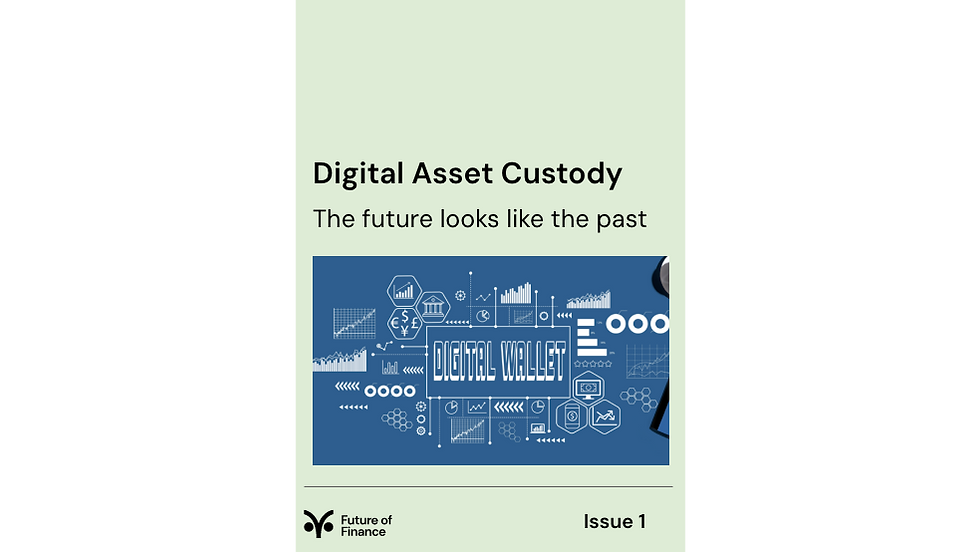Consolidation in the digital asset custody industry has started
- Jul 20, 2023
- 3 min read

Insurance is a classic instance of an immature industry reaching for the obvious stopgap when clients express concern about the absence of capital.
Boasting about the quality of the technology, or of the value of SOC or ISAE or ISO certification, also provides limited assurance by comparison with placing assets with a large and highly regulated bank.
For banks, however, there is work to be done before they can become digital asset custodians of the kind institutional investors want. And that work requires a degree of flexibility absent from conventional custody, because the rate of change in digital asset markets is faster.
Traditional custody networks add new markets or asset classes at a pace measured in years, whereas digital asset custodians have to add new blockchain protocols, newly issued cryptocurrencies, Stablecoins, NFTs and a range of DeFi apps at a pace dictated by customers that demand instant access to everything continuously.
So banks need to find a way to develop the flexibility to maintain the capabilities they to service digital assets.
For some established banks and exchanges, that way can be found in-house. SDX, for example, has developed a cryptocurrency “staking” service.16 But SDX has also invested in a digital asset custodian.
Acquisition is an obvious solution to missing capabilities, and SDX is not alone in taking that path. Cryptocurrency exchange Coinbase and Hauck & Aufhäuser, a German private bank with a technology bias, have both bought digital asset custody businesses in the last three years (see Table 1).
Table 1

Other acquirers were aiming to enhance existing capabilities. Genesis Trading bought the Volt1 digital asset custodian, for example, as the foundation of its prime brokerage capabilities.
Although market turmoil ultimately forced Celsius Network to sell GK8 to Galaxy Digital Holdings, the initial acquisition of the Israeli technology firm aimed to bolster the cyber-security capabilities of Celsius. The eventual owner of GK8, Galaxy Digital Holdings, had in September 2022 abandoned a long-standing ambition to acquire digital asset custodian BitGo Trust.
BitGo Trust, which was established as long ago as 2013, is among the most prestigious names in cryptocurrency custody, with FINMA and BaFin regulatory licenses and AuC of US$64 billion in November 2021, the month the cryptocurrency markets began their steady decline.
Difficulties in the cryptocurrency market help to explain why BitGo Trust is also the beneficiary of an interesting outsourcing arrangement announced in March 2023 by which customers of Genesis Trading can make use of a counterparty risk-reducing tri-party custody service provided by BitGo Trust (1). BitGo has had a longstanding partnership with Genesis on the trading side. (2)
Similar sensitivity to counterparty credit and custody risk is evident in the decision by Blockchain.com, provider of a cryptocurrency trading app, an exchange and a digital wallet, to appoint Standard Custody & Trust Company as the custodian for clients of Blockchain.com Asset Management (BCAM).
In addition to acquisitions and outsourcings, the difficulties in the cryptocurrency markets have also seen three digital asset custodians disappear from the market (see Table 7). Two of the withdrawals accompanied the failure of the Signature and Silvergate banks in the aftermath of the collapse of Silicon Valley Bank (SVB) in March 2023.
The third digital asset custodian to fail was DigiVault, the first cryptocurrency custodian to receive a licence from the FCA as compliant with Anti Money Laundering (AML) regulations. The parent company, Eqonex, failed in November 2022, and no buyer could be found for DigiVault amid the difficulties in the cryptocurrency markets.
Table 2

Yet the digital asset custody market also continues to attract new entrants, not only from banks under pressure from clients to offer a service19, but from long-established exchanges. CBOE Clear Digital has announced digital asset custody services. So the field of contenders is expanding even as it consolidates.
The challenge is to understand an evolving marketplace in digital asset custody services, as new entrants, established cryptocurrency custodians and traditional custodians adapt their services to the implicit and explicit demands of institutional investors, while remaining mindful of what it will take to become a “qualified” custodian.
Custody Industry
